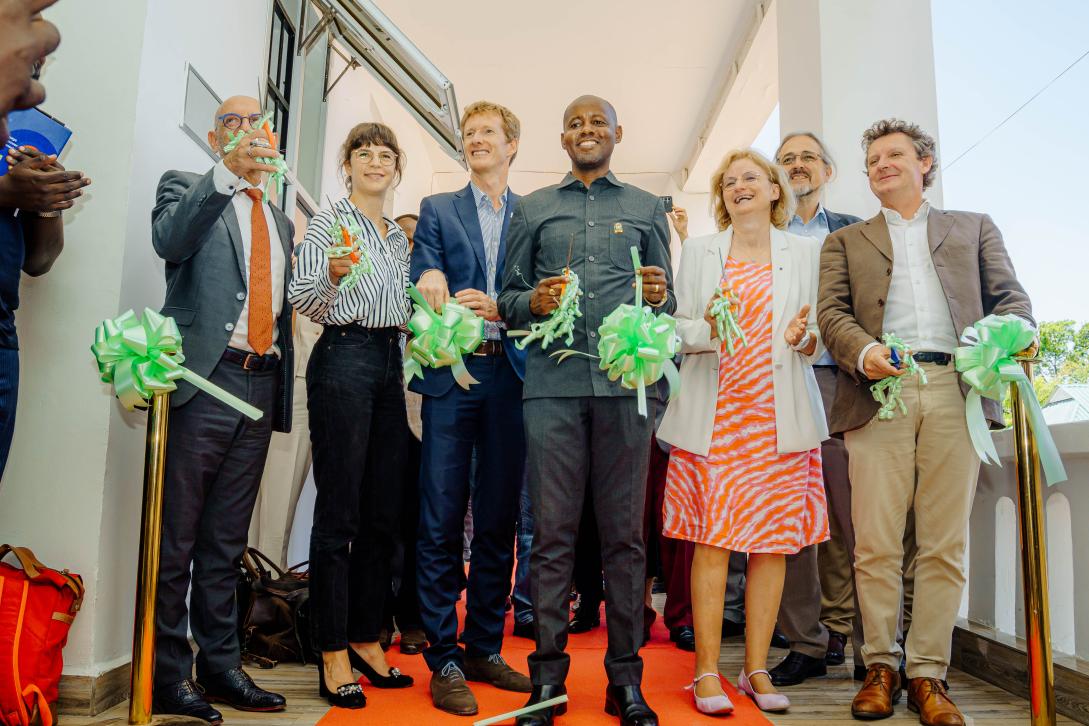Team Europe partners visit Tanga to launch joint initiatives on Blue Economy and Urban resilience

On the 20th and 21st of November, the Ambassadors of the European Union (EU) and Belgium, along with representatives of German Cooperation and the European development agencies Deutsche Gesellschaft für Internationale Zusammenarbeit (GIZ), Agence Française de Développement (AFD), and the Belgian Development Agency (ENABEL), visited Tanga to inaugurate and participate in joint initiatives within the framework of the Green and Smart Cities SASA and the Blue Economy for Job Creation and Climate Change Adaptation programmes.
Both are EU-funded Team Europe initiatives that bring together EU member states, development agencies, and local stakeholders in a coordinated effort to support sustainable urban development and coastal resilience in the region, in alignment with Tanzania’s national development priorities.
The European delegation was joined by Tanzanian authorities, including the Regional Commissioner, the City Director, the Mayor, and representatives from the President's Office - Regional Administration and Local Government (PORALG) and the Ministry of Fisheries. They all welcomed the initiative and appreciated the support and successful partnership.
In Tanga, the Green and Smart Cities SASA Programme focuses on three key projects—Promoting Wastewater Management and Sanitation Services in Tanga (PROWAS), Tanga Sustainable Urban and Fisheries Infrastructure Programme (TASUFIP), and Inclusive Cities for Enhanced Urban Resilience (INCLU-CITIES).
These projects have a combined budget of TZS 63 billion (EUR 22.5 million) and are implemented by GIZ, AFD, and ENABEL, respectively. The projects aim to enhance urban infrastructure, improve basic services such as water and waste management, and create economic opportunities for youth, women, and small businesses in sectors like seaweed farming, waste recycling, and the digital economy.
Meanwhile, Pwani Yetu is a Team Europe initiative co-funded by the EU and the German Government with an investment of TZS 13.11 billion (EUR 4.55 million). Implemented by GIZ, the programme complements the activities of the Blue Economy for Job Creation and Climate Change Adaptation initiative. It aims to maximize benefits for coastal communities by improving their adaptive capacities, enhancing livelihoods, and contributing to marine conservation.
One of the highlights of the visit was the official opening of the SASA Team Europe Office in the city center. This workspace is dedicated to fostering collaboration among all programme partners, facilitating closer ties with local stakeholders, ensuring the success and sustainability of ongoing projects, and helping to drive new initiatives and attract additional partners. After the opening, the delegation moved to Forodhani Park to witness a training activity for waste cleaning and recycling promoted by ENABEL under the INCLU-CITIES project.
The visit also provided an opportunity for GIZ to officially launch the Pwani Yetu project. The launch included participation from other implementing partners, such as the non-governmental organization Mwambao and the World Wide Fund for Nature (WWF), the Ministry of Fisheries, and representatives of local communities, who will play a key role in the project’s implementation.
As these initiatives gain momentum, they are set to serve as a model for future collaborations between Tanzania and international partners. By addressing critical issues such as urbanization, marine conservation, and climate adaptation, the Team Europe Initiative is poised to play a pivotal role in shaping Tanzania’s sustainable development journey.
EU Ambassador to Tanzania, Ms. Christine Grau, commented, "These initiatives show the EU's commitment to Tanzania’s development goals through inclusive and community-driven solutions and a reinforced role for local authorities. With our Team Europe partners, we are championing a sustainable Tanzania, aligned with the EU's Global Gateway strategy for greener, stronger partnerships.”
The programme concluded with a visit to the Port of Tanga, the second largest in the country. Its improvement and expansion are expected to significantly contribute to the region’s economy and reinforce the city’s strategic position along the main continental corridors.
